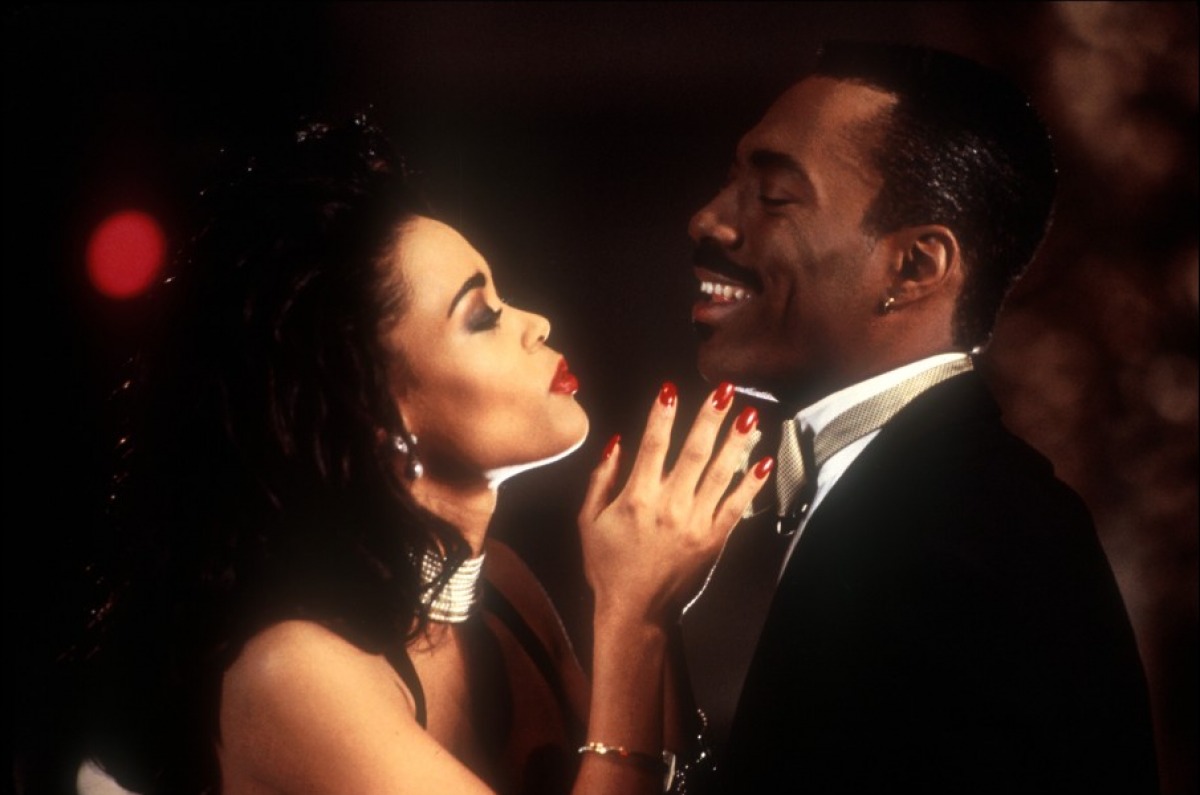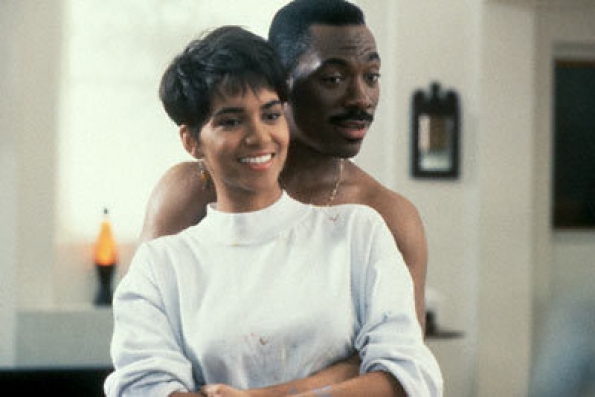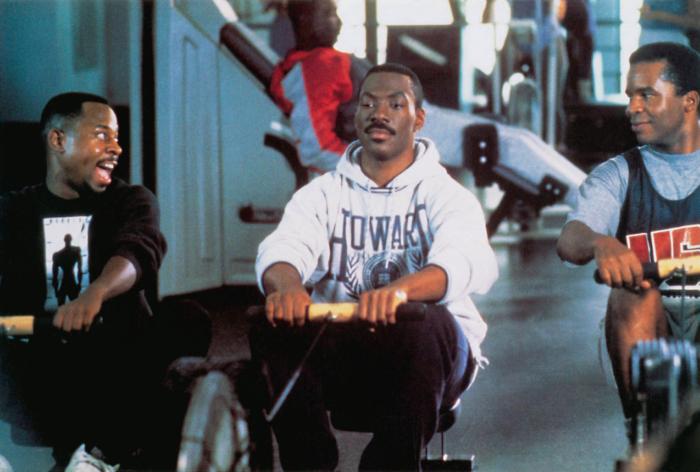The Boomerang Effect (and why Jacqueline's story is important)
 This post first appeared on The Loop 21 three years ago (The Loop 21 has since deleted the article...boo!). My article prompted a thoughtful response from director, Reginald Hudlin, which was also deleted by The Loop 21 (ugh!). Anyhoo, here's my take on one of my favorite movies of all time, Boomerang, and why I think Jacqueline's story is important.
This post first appeared on The Loop 21 three years ago (The Loop 21 has since deleted the article...boo!). My article prompted a thoughtful response from director, Reginald Hudlin, which was also deleted by The Loop 21 (ugh!). Anyhoo, here's my take on one of my favorite movies of all time, Boomerang, and why I think Jacqueline's story is important.
It’s hard to believe that eighteen years ago audiences around the country first laughed out loud at the box office hit film Boomerang (1992). The movie, arguably one of Eddie Murphy’s best films, introduced us to Bony T (Chris Rock), the incomparable antics of Strange (Grace Jones), and blessed us with Mr. Jackson’s (John Witherspoon) now legendary phrase, “Bang! Bang! Bang!” Without a doubt, Boomerang is one of the best American comedies of the twentieth century.
I’ve watched Boomerang at least several dozen times throughout my life (I was eleven years old when the film was first released). Each time I watch the film, I gather something new, whether it be one of Tyler’s (Martin Lawrence) pro-black conspiracy theories or the unintended comical reactions of an extra on the exercise machine in the background.
However, as I’ve gotten older, I’ve watch the movie with a different lens--a more grown up one, if you will. Needless to say, the more I watch Boomerang the more I notice Robin Givens’ character, Jacqueline, as the quintessential villain presumably because she can manage a career and a sex life.
Let me explain.
I've always been more interested in Jacqueline, a highly successful and sexual Black woman, than Marcus, the predictable dunce who eventually learns a lesson about love. My main argument is that while both Marcus and Jacqueline are flawed, it only seems that Marcus gets rewarded in the end by living a happy life with Angela (Halle Berry) and Jacqueline gets vilified, never seen or heard from again. The thematic conclusion presented in the plot eerily reflects real world assumptions about sex and romantic relationships.
(Note: The point of this article is not to set up useless binaries between heterosexual men and women, but to explore how the relationships presented in Boomerang might be a reflection of society's problem with successful, independent, sexual, and loving women.)
I’ll start with the counter arguments then explain the problems with each as it relates to a larger discussion of gender and sexuality in the context of romantic relationships.
Counterargument #1: It’s not about Jacqueline being able to manage a career and sex life, it’s about my man Marcus being done wrong!
In fact the story is also about Jacqueline, though the Hudlin Brothers and Eddie Murphy chose to highlight Marcus as the central character who can learn from love. We never know what happened to Jacqueline after she told Marcus “it’s over” and left hurriedly to catch the cab. We also don’t know what happened to Jacqueline after Marcus left her in the bed upon realizing he loved Angela. Did Jacqueline find another lover, (perhaps a woman?), to fill the void that Marcus left? As the audience, we’re left to assume that Jacqueline 'got what she deserved' because she was cold-hearted (similar to how Marcus was earlier in the movie).
 Interestingly enough (as noted on the DVD audio commentary), “the Executives at Paramount Pictures were nervous about casting Robin Givens in the film because she was disliked by many in the general public due to her past with Mike Tyson.”
Interestingly enough (as noted on the DVD audio commentary), “the Executives at Paramount Pictures were nervous about casting Robin Givens in the film because she was disliked by many in the general public due to her past with Mike Tyson.”
Hudlin continues to say however, “that actually made [Givens] perfect for the role, that she was this formidable person, and a match for Eddie Murphy, who also had an increpid reputation as a ladies' man. So, I wanted the audience to feel like this would be a fair fight.”
Mr. Hudlin’s boxing references were not unintentional. Robin Givens was perfect for the role, not simply because she could act, but because of her public battle with ex-lover, Mike Tyson. Essentially Jacqueline’s character, played by a women who in real life was was ostracized publicly for her relationship with a successful Black man, was thought of as a formidable opponent to Eddie Murphy’s character Marcus because she could match wits with him sexually and intellectually.
Robin Givens was the perfect woman to play Jacqueline, the villain, because in real life she was the villain.
The idea of woman as villain, both real and imagined, also speaks to a larger societal issue concerning successful and outspoken women who publicly battle with (what should be) private romantic relationships. Often times these battles involve more than simply a lovers quarrel, but rather serious issues concerning domestic violence and sexual abuse. Whether it be Mike Tyson or Marcus Graham, to suggest that either have been 'done wrong' by a woman seems a bit shortsighted, but nonetheless a predictable response in a patriarchal society that has yet to accept its role in the proliferation of gender biases while minimizing the complexhood of a woman's sexuality within romantic relationships.
Counterargument #2: Jacqueline is karma in the flesh, not a villain.
Women are not personifications of abstract ideas, but rather, we are human beings; the stuff that personification is actually made of. As Hollywood depicts women as karma in the flesh and thereby saviors of men, the reality is that "the over-reliance on 'woman wisdom' leads to lack of accountability on the part of men." In a society that is infatuated with categories, we have to keep in mind that each time we label women and men based on constructions, we also Otherize them, turning the individual into an idea or an object that’s easier to judge, trivialize, and indeed scrutinize.
By accepting Jacqueline as the villain, we also assume that her purpose is to teach Marcus a lesson, and essentially make us feel better about reconciling the guilt of treating someone in our lives wrongly. What about Jacqueline’s autonomy and personhood? Granted she too was flawed, as noted earlier, but can we honestly accept that her flaws only served as means to make Marcus (the man in her life) a better person?
Notably, the scene between Marcus and Angela highlights this issue. When Marcus audaciously tells Angela, “I’m a better person because of you” we understand that Marcus still doesn’t get it (as illustrated when Angela slaps him in the face). Though despite Marcus’ misuse of Angela, he still gets the girl in the end.
 The Importance of Jacqueline’s Story
The Importance of Jacqueline’s Story
Which brings me back to why I’m interested in Jacqueline’s story. Though she’s as flawed as Marcus, she’s also extremely powerful in her own right. Her sexuality, intelligence, and success, though mysterious for the most part, are relatable. It’s unfortunate, however, that her story wasn’t intriguing enough for the writers to make it central to the plot. Though, it may just be a refection of how we haven’t reached the point yet where stories like Jacqueline’s are welcomed in public discourse about romantic relationships. While Steve Harvey tells women and men how to act, some of us are (or will eventually be) brave enough to tell our own stories.
At times, I wish another Boomerang would be produced so I can admire the characters all over again. But as one friend reminded me, "some movies have to be appreciated in our past, never in present."
Indeed.
